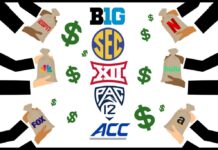Race. Prejudice. Fear. Change.
In America, these are not conversational comfort zones. So in a sense, Mark Cuban’s honesty about what we should all easily agree is an ingrained prejudice that is an unfortunate part of the human condition, required a certain sort of ballsiness. And chopping up the Dallas Mavericks owner’s lengthy interview in Nashville on Wednesday with Inc. Magazine in ways that either ignorantly or intentionally strip his comments of all context and nuance? That takes a certain sort of ballsiness, too, I suppose .
The subject of conversation was “banned-for-life” Donald Sterling and the Clippers owner’s grotesque views on race.  Cuban boldly admitted that he too harbors prejudices. “We’re all prejudiced in one way or the other,’’ is a key quote and the foundation of Cuban’s stated views… but a quote that’s been buried beneath another far more incendiary one: “If I see a black kid in a hoodie and it’s late at night, I’m walking to the other side of the street.”
Cuban boldly admitted that he too harbors prejudices. “We’re all prejudiced in one way or the other,’’ is a key quote and the foundation of Cuban’s stated views… but a quote that’s been buried beneath another far more incendiary one: “If I see a black kid in a hoodie and it’s late at night, I’m walking to the other side of the street.”
Period. Closed quote. End of story.
Right?
Wrong.
The full context of Cuban’s quotes on this subject:
“You know, in this day and age, this country has really come a long way. Putting any type of bigotry behind us — regardless of who it’s towards, whether it’s the LGBT community, whether it’s xenophobia, you know, fear of people from other countries — we’ve come a long way, and with that progress comes a price. We’re a lot more vigilant in what we … and we’re a lot less tolerant of different views, and it’s not necessarily easy for everybody to adopt, or adapt, or evolve. We’re all prejudiced in one way or the other. If I see a black kid in a hoodie and it’s late at night, I’m walking to the other side of the street. If on that side of the street, there’s a guy that has tattoos all over his face — white guy, bald head, tattoos everywhere — I’m walking back to the other side of the street. And the list goes on of stereotypes that we all live up to and are fearful of.
And so, in my businesses, I try not to be hypocritical. I know that I’m not perfect. I know that I live in a glass house, and it’s not appropriate for me to throw stones. And so when I run into bigotry in organizations I control, I try to, to find solutions. I’ll work with people — I’ll send them to training, I’ll send them to sensitivity training, I’ll try to give them a chance to improve themselves. Because I think helping people improve their lives, helping people engage with people they may fear or they may not understand, and helping people realize that, while we all have our prejudices and bigotries, we have to learn that it’s an issue that we have to control. That’s part of my responsibility as an entrepreneur, to try to solve it, not just to kick the problem down the road. Because it does my company no good, it does my customers no good, it does society no good if my response to somebody and their racism or bigotry is to say, “It’s not right for you to be here, go take your attitude somewhere else.”
Ah. Context. Subtlety. Nuance. Understanding.
 They are available, in there somewhere, if we want to fish them out. But in too much of the discussion that has ensued as a result of Cuban’s remarks, we skip beyond context, subtlety, nuance and understanding. And we remain magnetized to our discomfort with discussions of race, prejudice, fear and change. If you actually watch the video interview, you may come to the conclusion that Cuban mentioned the “walk to the other side of the street’’ action as a hypothetical cliché and that at the end of the hoodie/tattoo mentions, he uses the word “we.’’ Meaning, this is, figuratively, what “we’’ often do as a result of prejudice.
They are available, in there somewhere, if we want to fish them out. But in too much of the discussion that has ensued as a result of Cuban’s remarks, we skip beyond context, subtlety, nuance and understanding. And we remain magnetized to our discomfort with discussions of race, prejudice, fear and change. If you actually watch the video interview, you may come to the conclusion that Cuban mentioned the “walk to the other side of the street’’ action as a hypothetical cliché and that at the end of the hoodie/tattoo mentions, he uses the word “we.’’ Meaning, this is, figuratively, what “we’’ often do as a result of prejudice.
Not racism. Prejudice.
The more ignorant you are, the more you think the two words mean the same thing. Cuban’s acknowledgment of his prejudice is an honest one, even though using the “black kid in a hoodie’’ illustration evokes disturbing thoughts about the tragic death of Trayvon Martin. In fact Cuban tweeted late yesterday, “In hindsight I should have used different examples. I didn’t consider the Trayvon Martin family, and I apologize to them for that.” He added, “Beyond apologizing to the Martin family, I stand by the words and substance of the interview.”
For the record, Cuban has stated he views Sterling’s comments as “abhorrent” and “obviously racist,” and says he trusts Commissioner Adam Silver – who plans on Sterling’s ouster – to “operate under the best interest of the NBA.” At the same time, Cuban considers the dismissal of Sterling the potential start of a “a very, very slippery slope” because “you can’t legislate stupidity.”
Nor can you legislate listening.
Again, Cuban likely does not literally “cross the street’’ when he sees a black kid. He is attempting to make a larger point – arguably in a way that could’ve been presented with more sensitivity – about how humans react to other humans. Yet by having the balls to address cultural bigotry (however inelegantly), Cuban is now branded by some as a cultural bigot.
The short version of this process:
Concerned Citizen: “Let’s have a frank conversation about prejudice.’’
Cuban: “OK. We’re all prejudiced in one way or the other.’’
Concerned Citizen: “RACIST!!!’’
In the full interview, Mark Cuban’s reflective point about himself, and about the rest of us, is made … if you allow yourself the benefit of context. The man’s point is lost, however, if you allow yourself to just cherry-pick from a lengthy interview a 23-words sound-bite that that illustrates very little … except maybe, once again, how frightened most Americans are to discuss race, prejudice, fear and change.









